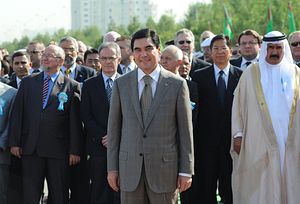Couples seeking to get married in Turkmenistan will have one more hoop to jump through before tying the knot: an HIV test. According to state-controlled media–as reported by AFP and AP–Ashgabat passed a law this week mandating HIV tests for “persons entering marriage” as well as blood donors, prisoners, foreign citizens applying for work visas, and “persons suspected of narcotics use.”
The new HIV testing law is designed to “in order to create conditions for forming healthy families and avert the birth of HIV-infected children.”
As noted by RFE/RL, the law “implies that anyone found to be infected with the virus that is the precursor to AIDS would be denied a marriage license.”
The new HIV law, from both a public health and a human rights perspective, is troublesome. It certainly contributes to the stigmatization of people with HIV and from the scant details available isn’t focused on providing care for the individuals, but simply preventing them from getting married. Turkmenistan is far from transparent in nearly every area, including in regard to HIV prevalence.
For example, the UNAIDS country profile for Turkmenistan contains no information whatsoever. In 2010, Eurasianet, citing reports from the Turkmen Initiative for Human Rights, wrote that 68 HIV-positive individuals had been identified in Turkmenbashi although the government officially only acknowledged two cases. But, in an article about his first visit to Turkmenistan on the occasion of World AIDS Day in January 2015, Michel Kazatchkine, the UN Secretary General’s Special Envoy on HIV/AIDS in Eastern Europe and Central Asia, wrote, “No single case of HIV infection has been reported in the last 15 years.”
Kazatchkine visited the National Center for Prevention of HIV/AIDS in Ashgabat and said it conducted about 100 tests each day. Kazatchkine cited stigmatization (health professionals referred to HIV as “the problem”), lack of civil society support, and a false sense of security stemming from the country’s repressive laws and tight controls on the movement of people in and out, as setting the country up as “poorly prepared to respond” to an epidemic.
In this context, the new law isn’t a positive development, but rather a continued widening of repressive policies in a country where health consciousness is more show than substance.
In case you were unaware, in Turkmenistan April is the Month of Health and Sports. The country–led by dentist-turned-President Gurbanguly Berdimuhamedov since 2006–is very health-conscious in a pageantry-driven way. Turkmenistan’s first president, Saparmurat Niyazov, was decidedly less health-obsessed despite declaring Health Day a public holiday. He marked it in 2000 by taking his cabinet on a long walk on the Serdar Path (also called the Walk of Health) a nearly five-mile pathway of concrete steps. Niyazov didn’t make the trek himself; he took a helicopter to the finish. (There’s a picture of part of the path in this 2013 Atlantic photo essay on Turkmenistan). Niyazov was far from a paragon of health care in the country. Before dying of a heart attack in 2006, Niyazov reportedly fired 15,000 medical workers and closed regional hospitals. In a 2014 report, Farangis Najibullah and the RFE/RL Turkmen bureau said Niyazov had called the hospitals “unnecessary luxuries.”
Berdimuhamedov, meanwhile, has made a great show of health consciousness. There is a wealth of photos of him riding horses (sometimes falling off them), working out at the gym, and biking on Ashgabat’s empty streets. He’s made the Month of Health and Sport a spectacle. Check out these clips from Turkmen state TV put together by RFE/RL’s Turkmen bureau (and set to amusingly appropriate music, in my opinion) which shows Turkmen engaged in mass demonstrations of devotion to physical activity.

































